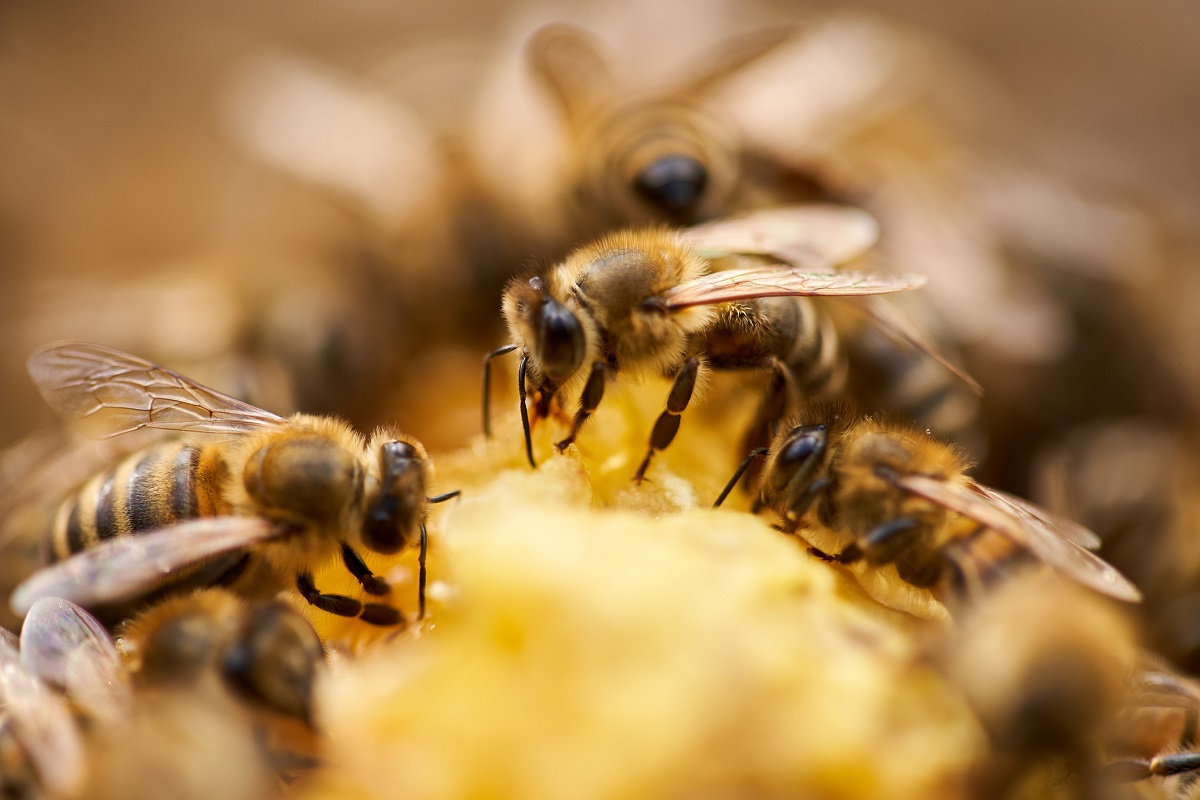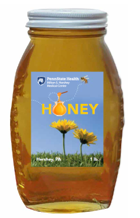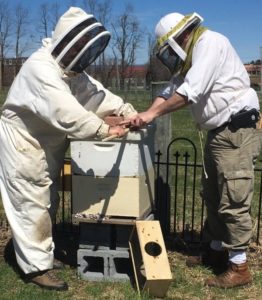Honey, sweet honey: Penn State Health beekeepers’ annual harvest is in full swing

The air is abuzz with anticipation for some 200 pounds of honey coming off the hives at Penn State Health’s campus this fall.
“We’ve had a very good year,” said Dr. Andrew Freiberg, pediatric hematologist/oncologist at Penn State Health Children’s Hospital. “Often you lose half your hives in the winter, but all five of our hives survived last winter. We got a very good head start, and the bees started making honey early.”
Thanks to the time Freiberg and his beekeeping colleague Scott Stanley, a study coordinator at Penn State Neuroscience Institute, donate to managing the apiary, one could argue the Hershey community itself is a healthier hive.

That’s because all the money raised from selling the honey – nearly $800 thus far – goes to fund the Hershey Community Garden, located on the campus of the Milton S. Hershey Medical Center.
The garden, a joint project with The Hershey Company, Milton Hershey School, Hershey Entertainment & Resorts and The M.S. Hershey Foundation, provides community members access to more than 200 plots on which to cultivate produce in exchange for a donation.
Some of the produce is sold at the Farmers Market in Hershey, giving area residents access to locally-sourced, healthy food and to weekly health and wellness education offered by Penn State Health. Excess food produced at the community garden keeps on giving at the Hershey Food Bank, Ronald McDonald House and other community organizations.
This year, Freiberg suspected that the hives were thriving due to his unique method of checking on his bee friends even when he can’t open the hives―he places his stethoscope on the outside to listen for buzzing inside.
“The bees seal their hives for winter from November to February,” he explained. “We leave 50 pounds of honey on for the bees to eat over the winter. They generate heat and keep warm.”
Freiberg and Stanley are full of facts about the intriguing life of honeybees.
“The more you know about bee dances, how honeybees communicate, how they make a new queen, the more fascinating it is,” said Freiberg, who also finds beekeeping is a good stress reliever.

Dr. Andrew Freiberg, left, and Scott Stanley work with a honeybee hive on the campus of Hershey Medical Center.
While exciting, extracting the honey is a minor part of beekeeping, said Stanley, who got interested during college and now travels internationally teaching classes on the subject.
In the spring, hives must be assessed, split if necessary and antibiotics given to ward off pests. Summer demands frequent inspections to make sure hives are thriving―an activity for which Freiberg keeps extra bee suits on hand for medical students and faculty who want to participate. Fall brings the harvest and another round of antibiotics, and beekeepers use the winter months to do upkeep on bee boxes and frames.
Honey is known for its medicinal properties, making it even more interesting to Freiberg and Stanley. Honey’s antibacterial properties aid in treating wounds and burns and even as a remedy for coughs. A study by Dr. Ian Paul, a pediatrician at the Children’s Hospital, found honey to be an effective alternative to over-the-counter cough medicines for children (over the age of one), without any potential side effects.
The quality of Penn State Health honey was verified when it won sixth place honors at the 2018 Pennsylvania Farm Show, based on its moisture content, flavor and freedom from crystals and foam. The pair plans to enter it again this year.
“Submitting our honey to the Farm Show demonstrates that Penn State Health is a part of the local community,” Stanley said. “We’re giving back to the community through our education, the community garden and serving as a resource, plus our bees are pollinators of local trees, farms and gardens.”
This year’s honey is available for purchase by contacting Freiberg at afreiberg@pennstatehealth.psu.edu or Stanley at sstanley2@pennstatehealth.psu.edu.
Help us share the good news going on at Penn State Health, including small happenings that might otherwise go unnoticed. Have a “Pawsitivity” story to share with us? Email us and write “Pawsitivity” in the subject line
If you're having trouble accessing this content, or would like it in another format, please email Penn State Health Marketing & Communications.
